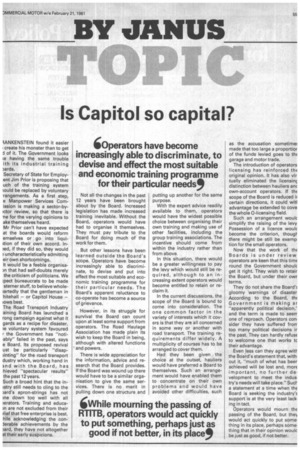Is Capitol so capital?
Page 61

If you've noticed an error in this article please click here to report it so we can fix it.
3ANKENSTEIN found it easier , create his monster than to get I of it. The Government looks [e having the same trouble ith its industrial training pards.
Secretary of State for Employent Jim Prior is proposing that uch of the training system iould be replaced by voluntary Tangements. As a first step, e Manpower Services Cornission is making a sector-by!ctor review, so that there is ne for the varying opinions to ake themselves heard.
Mr Prior can't have expected at the boards woOld reform emselves or go into liquiition of their own accord. In)ed, if they did so, they would ?uncharacteristically admitting eir own shortcomings.
It would be a feeble organisem that had self-doubts merely the criticism of potiticians. We :pect bureaucrats to be made sterner stuff, to believe whole?artedly that the gentleman in hitehall — or Capitol House — lows best.
The Road Transport Industry aining Board has launched a rong campaign against what it gards as a recipe for disaster. le voluntary system favoured the Government has "notiably" failed in the past, says e Board. Its proposed revival ust be particularly "disaptinting" for the road transport dustry which, working hand in and with the Board, has hieved "spectacular results" the past 12 years.
Such a broad hint that the inJstry still needs to cling to the )ard's apron-strings has not me down too well with all )erators. Training and educam are not excluded from their !lief that free enterprise is best. hile acknowledging the conlerable achievements by the )ard, they have not altogether st their early suspicions. Not all the changes in the past 12 years have been brought about by the Board. Increased legislation has made increased training inevitable. Without the Board, operators would have had to organise it themselves. They must pay tribute to the Board for doing much of the work for them.
But other lessons have been learned outside the Board's scope. Operators have become increasingly able to discriminate, to devise and put into effect the most suitable and economic training programme for their particular needs. The Board's apparent reluctance to co-operate has become a source of grievance.
However, in its struggle for survival the Board can count upon at least some support from operators. The Road Haulage Association has made plain its wish to keep the Board in being, although with altered functions 'and powers.
There is wide appreciation for the information, advice and research that the Board provides. If the Board was wound up there would have to be a similar organisation to give the same services. There is no merit in pulling down one structure and putting up another for the same purpose.
With the expert advice readily available to them, operators would have the widest possible choice between organising their own training and making use of other facilities, including the group training associations. The incentive should come from within the industry rather than from above.
In this situation, there would be a greater willingness to pay the levy which would still be required, although to an increasing extent operators would become entitled to retain or reclaim it.
In the current discussions, the scope of the Board is bound to come into consideration. The one common factor in the variety of interests which it covers is that they are all concerned in some way or another with road transport. The training requirements differ widely. A multiplicity of courses has to be arranged to cover them.
Had they been given the choice at the outset, hauliers would have preferred a Board to themselves. Such an arrangement would have enabled them to concentrate on their own problems and would have avoided other difficulties, such as the accusation sometime: made that too large a proportior of the funds levied goes to thE garage and motor trade.
The introduction of operators licensing has reinforced thE original opinion. It has also vii tually eliminated the licensinc distinction between hauliers anc own-account operators. If thE scope of the Board is reduced ir certain directions, it could witt advantage be extended to cove the whole 0-licensing field.
Such an arrangement woulc simplify the raising of the levy Possession of a licence woulc become the criterion, though there might be still be exemp tion for the small operators.
Now that the work of thE Boards is under review operators are keen that this timE round the Government shoulc get it right. They wish to retair the Board, but under their owr terms.
They do not share the Board': gloomy warnings of disaster According to the Board, thE Government is making ar "apparently political decision,' and the term is made to seenone of reproach. Operators con. sider they have suffered frontoo many political decisions ir the past. They can hardly refuse to welcome one that works tc their advantage.
Even less can they agree with the Board's statement that, with out it, "much of what has beer achieved will be lost and, more important, no further de. velopment to meet the indus, try's needs will take place." Such a statement at a time when thE Board is seeking the industry's support is at the very least lack. ing in tact.
Operators would mourn thE passing of the Board, but they would act quickly to put some thing in its place, perhaps something that in their opinion woulc be just as good, if not better.
































































































